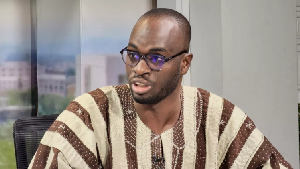This thoughtful publication as much as it is destined for the attention of the Basoah/Serwaah nuclear and extended families, any Ghanaian or person is equally authorized to read it for their appreciation and understanding of family values and what the future can hold for anyone either in their lifetime or after their death.
My great-grandmother, Nana Asieduaa, of Juaben-Asiampa, the eldest sibling of four children, was understood to be visibly sporting a protrusion on her back, thus, she was slightly humped.
She was teased by the village folk to never be able to get married, or never be able to carry her children on her back if she ever birthed.
The four siblings were, Asieduaa, Mogyeɛ, Kwasi Donkor, and Akyeamaah.
However, as man proposes and God disposes of, she gets married and gives birth to three children, namely, Kwasi Kodua, Gyamfuah, and Kwadwo Agyei. She was miraculously able to carry her babies on her back to the shock of both her siblings and enemies/ friends.
What is shocking about this? Does Providence not consider such situations? If it were not so, Nigerians wouldn’t be saying, “Na cow no get tail, na God de drive am flies”. They mean, God drives away flies from the tailless cow, to wit, God takes care of the problems of the poor and the needy persons or redeems people from their difficulties but at the appropriate time within His plan.
When she died, none of her female siblings was prepared to inherit her. They kept rejecting in turns the request to them to inherit her as our Akan or Asante tradition demands. They were turning down the request to inherit her because she was extremely poor and without anything to be inherited.
I have been told, they were rejecting the offer to them to inherit her saying, and in turns, in Twi, “Wɔ nni apanpan si brɛ”, to wit, she has nothing to be inherited.
“Apanpan” is a tray used for fetching foodstuff from the farm by female farmers and carried on the head. The same tray is used by hawkers on the streets of Ghana’s cities and towns.
She did not even have a space for such a small tray hence it was not worth accepting to inherit her, they concluded.
Sorry folks, there is a lump in my throat now. I am having teary eyes at this stage. However, I shall manage to continue to write this true-life story to the desired conclusion. This was how destitute my unknown great-grandmother was and disgracefully treated at death by her mother and father's siblings.
One of her extended family members from Pankese in the Eastern region, offered to inherit her saying, “I will inherit her. Even if she has nothing, at least, she has left me three precious children and the children are worth a lot”.
Her children grew up to bear children of their own.
Gyamfuah, who was later to become my unknown grandmother, gave birth but lost all her children at their infancy or young age, except my mother. My mother, later to be affectionately renamed and called Awo Serwaah, became a “fille unique”, thus, only child.
Her mother, Gyamfuah, died when she, Awo, was an adolescent.
The fact that Gyamfuah was repeatedly losing her children, her siblings, and other relatives looked eerily at her, insinuating she was a witch. Therefore, when she fell seriously ill, she was taken to a fetish shrine in the belief that she had been struck by the fetish for being a witch.
Despite her insistence to her siblings and relatives to rather move her to the hospital because she was sick but not a witch, they did not heed her pleas. They kept her at the shrine until she passed. So callously did the relatives ignore her; left her to die and buried in an unmarked grave at the shrine.
Tears are streaming down my cheeks, dropping like beads onto my desk. Although overwhelmed with emotions, I will continue until I have told the world the oxymoronic story of my great-grandmother, Nana Asieduaa. For I want to encourage people in similar destitution to never despair as the future is full of surprises for them.
Years later, beautifully slender, and grown-up Awo Serwaah’s hand was asked in marriage to alias Kwame Basoah. This only child of Nana Gyamfuah gave birth to eleven children. Two of the children are deceased. They were Kwadwo Duah and Nana Amma Akyeamaah, the sixth and eighth born, respectively.
As the path of God in the life of individuals may be tortuous but not as straight as one may expect, the great and great-great-grandchildren of Nana Asieduaa are now many and keep increasing. They are found in some towns in Ghana with most of them residing in Germany, France, the United Kingdom, and the United States of America.
Almost are the children, grandchildren, and great-grandchildren of Awo Serwaah are living abroad.
Great-grandmother Asieduaa may be happy wherever she is to see how far God has brought her descendants. What a perfect practical case of the stone that the builder rejected as in Matthew 21:42 “Jesus said unto them, “Did ye never read in the Scriptures: ‘The stone which the builders rejected, the same is become the head of the corner. This is the Lord’s doing, and it is marvellous in our eyes”?
Her siblings rejected to inherit her for the reason specified above, but God made her poor to make her descendants great. Awo Serwaah has over forty-five of her children, grandchildren and great-grandchildren presently living abroad.
Before her demise, Awo used to spend time with her children in both London and Paris and the last time she returned to Ghana to come back no more on European visit, she spent three consecutive years with me in London.
I am publishing this true story to advise the children and great children of Awo Serwaah to know their family’s humble and mocked beginnings and how far they have come. They must be guided by this to aspire for greater things to continue to prove wrong those who mocked and rejected Nana Asieduaa, even in death.
This is what God can do.
I call on the grandchildren and great-grandchildren of Awo Serwaah to name some of their children after her and their great-great-grandmother Asieduaa. They must also name some after Nana Gyamfuah. We should not let their names vanish, or slip away, from, the family but be kept and remembered always.
I have done my part of the naming and I leave it to the rest of the Nana Asieduaa family to continue.
It will be a shame for us not to recognize our grandparents in appreciable ways to bring smiles to their faces wherever they are.
To fellow Ghanaians, please don’t reject family members, relatives, and friends for being poor as it was the situation of my great-grandmother.
The four mentioned siblings’ mother was Nana Adutwumwaa.
Opinions of Wednesday, 27 December 2023
Columnist: Rockson Adofo















